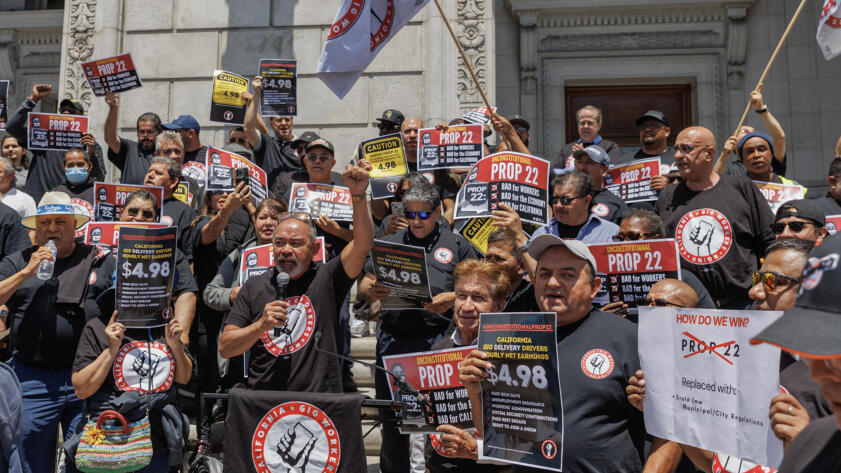Tens of thousands of California ride-hailing drivers, and possibly more, could eventually get back pay after a recent U.S. Supreme Court decision that clears the way for the state and some cities to proceed with their lawsuits against Uber and Lyft.
The two companies had argued that because their drivers had signed arbitration agreements, the wage theft lawsuits that California filed against Uber and Lyft in 2020 were invalid. But last week, the nation’s highest court declined to hear the companies’ appeal.
In a statement to CalMatters on Tuesday, California Labor Commissioner Lilia Garcia-Brower said her office, along with state Attorney General Rob Bonta and city attorneys from Los Angeles, San Francisco and San Diego, have been trying to pursue enforcement actions on behalf of the drivers for more than four years. Their lawsuits — two by the labor commissioner against each of the companies, and another by Bonta and the three cities — accuse the companies of misclassifying their workers as independent contractors; failing to pay minimum wage for all time worked; not paying for breaks, overtime and sick time; and more.
“We are ready for our day in court to obtain recovery of wages and expenses for these workers,” Garcia-Brower said.
Bonta’s office said in an email Tuesday that its case, which it also brought in 2020, can now proceed in California Superior Court: “We remain committed to defending the rights of California workers to receive the benefits and protections to which they are legally entitled.”
Theane Evangelis, an attorney for Uber, said in an emailed comment after the U.S. Supreme Court decision last week that the court should have taken a federal arbitration law into consideration: “While the Supreme Court did not take this opportunity to weigh in now, it should do so in the future.”
State officials filed the lawsuits before Uber, Lyft and other gig companies successfully passed a ballot measure in November 2020, exempting them from California labor law. That measure, Proposition 22, was upheld over the summer by the state Supreme Court. Because Prop. 22 allows gig companies to treat drivers and delivery workers as independent contractors, the labor commissioner’s office can no longer handle wage claims filed by gig workers after the law went into effect, meaning nobody at the state is enforcing the industry-backed law.
But Garcia-Brower is still trying to hold the companies accountable for the pre-Prop. 22 era, though she said the process will take more time: “We are confident we can demonstrate that Uber and Lyft drivers were employees under the test that applied at the time.”
Uber had argued that that test, Assembly Bill 5, which would have required the companies to treat their drivers and delivery workers as employees, was unconstitutional and unfairly targeted them. But Tuesday, the U.S. Supreme Court also denied the company’s petition to be heard on that issue.
“Fortunately, in Proposition 22, California voters rejected AB 5,” Evangelis said.
A spokesperson for Lyft would not comment.





